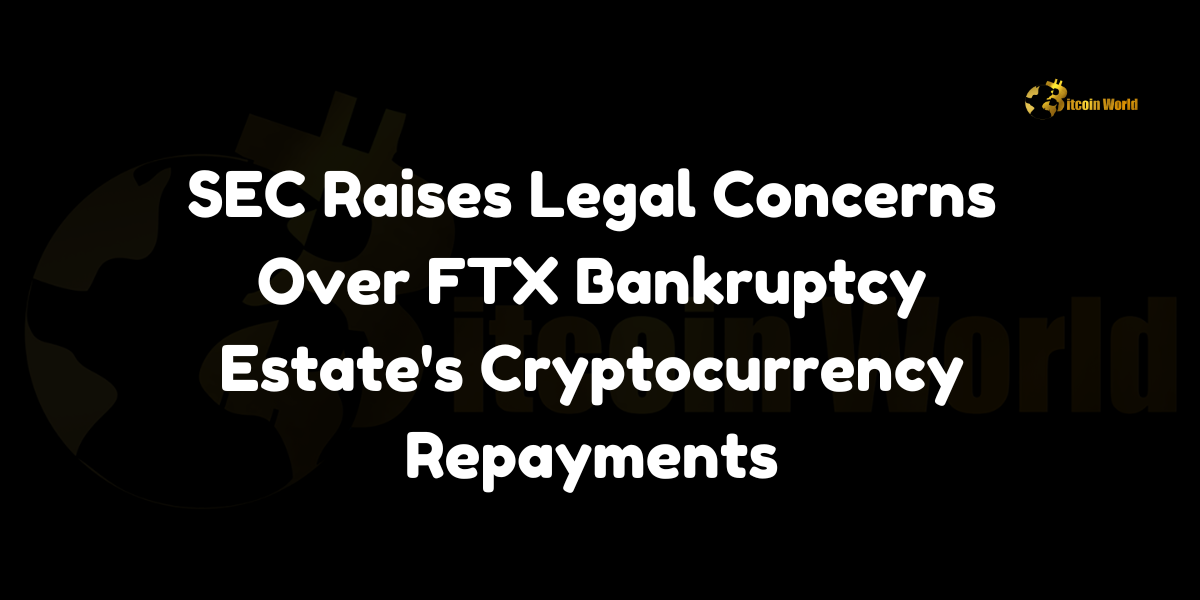SEC FTX bankruptcy cryptocurrency repayments have become a focal point of concern following a recent filing by the U.S. Securities and Exchange Commission (SEC). The SEC has signaled that it may challenge the legality of the FTX bankruptcy estate’s plans to manage and monetize its cryptocurrency holdings. This development comes amidst ongoing deliberations over how the estate should repay creditors, some of whom prefer to be compensated in cryptocurrency rather than cash.
SEC’s Warning to the FTX Bankruptcy Estate
In its recent filing, the SEC cautioned the FTX bankruptcy estate that it might question the legality of any attempts to handle repayments or profit from the cryptocurrency assets it currently holds. While the SEC has not outright declared these actions illegal, it has left open the possibility of legal challenges against transactions involving cryptocurrencies as part of the bankruptcy proceedings.
The SEC’s warning highlights the regulatory uncertainty surrounding cryptocurrency transactions, especially in the context of bankruptcy and financial restructuring. The agency’s concerns could potentially complicate the process of repaying FTX’s creditors, particularly those seeking to recover their losses in the form of cryptocurrencies rather than fiat currencies.
The FTX Bankruptcy Context
FTX, once a prominent cryptocurrency exchange, filed for bankruptcy following a catastrophic collapse that left many creditors and investors scrambling to recover their funds. The bankruptcy estate, which is now tasked with liquidating FTX’s assets to repay creditors, includes a substantial amount of cryptocurrency holdings. The estate’s plans for these assets have been a subject of intense scrutiny, both from regulators and the creditors themselves.
Recent reports indicate that some of FTX’s creditors have expressed a desire to be repaid in cryptocurrency rather than cash. This preference is rooted in the belief that cryptocurrencies may appreciate in value over time, potentially providing a greater return than a cash repayment. However, FTX’s estate has indicated that it plans to repay creditors in cash or U.S. dollar-pegged stablecoins, which could avoid the potential legal and logistical complications of handling volatile cryptocurrency assets.
Legal and Regulatory Implications
The SEC’s warning underscores the complexities involved in managing cryptocurrency assets within a bankruptcy framework. The legal status of cryptocurrencies in bankruptcy proceedings is still a developing area of law, with few precedents to guide the process. The potential for legal challenges from the SEC could further complicate the already intricate process of asset liquidation and creditor repayment.
One of the key issues at stake is whether the FTX bankruptcy estate can legally engage in transactions involving its cryptocurrency holdings without violating securities laws. The SEC’s concerns suggest that it may view certain types of cryptocurrency transactions as potentially infringing on existing regulations, particularly if those transactions involve securities-like behavior, such as raising funds or profiting from asset sales.
This regulatory uncertainty is a significant risk factor for both the FTX estate and its creditors. If the SEC decides to pursue legal action, it could delay the repayment process, potentially leaving creditors waiting even longer to recover their losses. Moreover, the outcome of any legal challenge could set important precedents for how cryptocurrencies are treated in future bankruptcy cases.
Creditor Preferences and the Role of Stablecoins
The preference among some FTX creditors for repayment in cryptocurrency rather than cash highlights the growing importance of digital assets in the financial landscape. For many, the volatility of cryptocurrencies is outweighed by their potential for significant appreciation, making them an attractive option for those looking to maximize their recovery from the FTX collapse.
However, the FTX estate’s plan to use cash or U.S. dollar-pegged stablecoins for repayments is likely an attempt to sidestep the regulatory and operational challenges associated with handling cryptocurrencies. Stablecoins, which are designed to maintain a stable value relative to a fiat currency like the U.S. dollar, offer a compromise by providing the stability of cash while still utilizing blockchain technology.
This approach may also align more closely with regulatory expectations, reducing the risk of legal challenges from the SEC or other regulatory bodies. However, it remains to be seen how creditors will respond to this plan, particularly those who have already expressed a preference for repayment in cryptocurrencies.
Conclusion
The SEC FTX bankruptcy cryptocurrency repayments warning introduces a new layer of complexity to the already challenging process of liquidating FTX’s assets and repaying creditors. The SEC’s concerns about the legality of cryptocurrency transactions within the bankruptcy estate could lead to significant delays or even legal battles, further complicating the resolution of one of the largest cryptocurrency bankruptcies to date.
As the situation unfolds, the decisions made by the FTX estate and the responses from creditors and regulators will likely set important precedents for how cryptocurrency assets are handled in bankruptcy cases going forward. For now, the FTX bankruptcy estate faces a delicate balancing act as it navigates the legal, regulatory, and financial challenges of repaying its creditors while staying within the bounds of the law.
To learn more about the innovative startups shaping the future of the crypto industry, explore our article on latest news, where we delve into the most promising ventures and their potential to disrupt traditional industries.
Disclaimer: The information provided is not trading advice, Bitcoinworld.co.in holds no liability for any investments made based on the information provided on this page. We strongly recommend independent research and/or consultation with a qualified professional before making any investment decisions.

